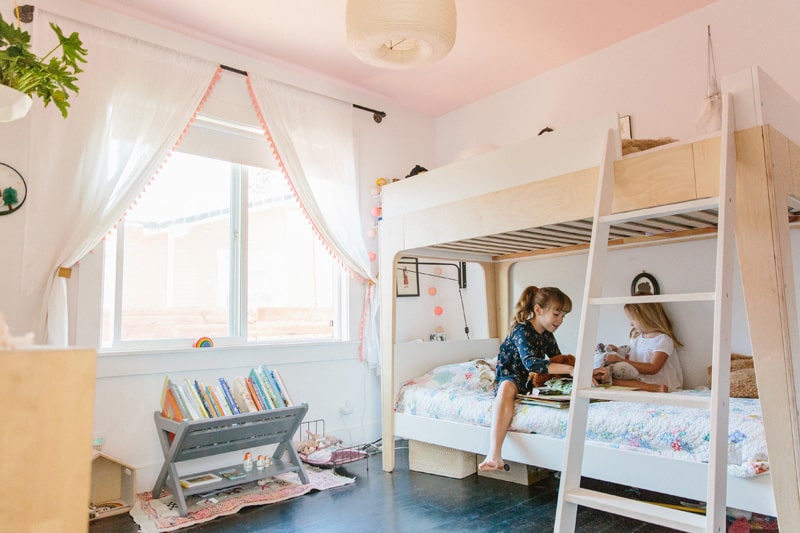
Fostering Childhood Friendships: 10 Ways To Help Your Kid
Written by Sara Langer
Photography by Elizabeth Antonia's Family, Photographed by Nicki Sebastian
Making new friends can be a daunting undertaking for both adults and children. But once those bonds are formed, the rewards and benefits of friendship are enormous. Research compiled by The Washington Post shows the importance of friendship, and its impact on mental and physical health. They found that friendships formed in early childhood are helpful in developing social and emotional skills, increasing a sense of belonging, and decreasing stress. And NPR’s story covering the loneliness epidemic in the U.S., reports that over half of Americans feel lonely and young people are some of the loneliest. Helping our young children develop and maintain friendships, especially through face-to-face connection, can have life-long benefits. And while some children are naturally social butterflies, others may need a little bit of help breaking the ice. So, just in time for back-to-school season, we’ve compiled ten tips to help you nurture the social side of your little one.
Talk about making friends and listen to your child’s concerns or fears.
Navigating the choppy waters of playground politics can be scary, confusing, and overwhelming for most kids. No matter how comfortable they are in social settings, other children’s reactions and behavior as playmates can most certainly throw them off balance. Kids are sensitive and can be especially so with their peers, therefore your support and conversations as a parent truly matter. Discussing how to deal with rejection is an important talking point that can help teach kids the highs and lows of relationships and can give them the support they need to bounce back from tough situations. Make sure you share some of your own trials and tribulations in making friends as a child. Hearing that you went through a similar experience will normalize it for them.
Practice and role play.
If you can give your child some experience and tools to help build their confidence in making friends, they will be more likely to initiate friendships on their own. Especially if your child will be starting a new school or they will have a new group of children to get to know in their class, a little coaching and practice can go a long way. Arm them with questions they can ask that would be helpful in getting to know people. Complimenting someone is a great way to get a conversation started with a stranger. Role play and model how you might do this yourself.
Be a role model for making friends.
It’s no secret that kids are more observant and aware than we give them credit for. Much to their chagrin, this happens without parents realizing what kind of behavior and habits they have been modeling until their little ones start to mimic them. Take advantage of this by using it as an opportunity to model what a good friend looks like. The old adage “to have a friend is to be one first” suggests the idea that empathy and consideration, two pillars of a good relationship, aren’t just qualities but learned skills that don’t always come naturally to younger kids. In the early years, children are more prone to think of themselves first and can greatly benefit from adults modeling kindness and compassion towards others. Do this by making simple gestures, such as preparing or delivering food to a sick friend, baking cookies for a new neighbor, or making a birthday card for a grandparent. Better yet, have your child think of something nice they can do for a friend or family member.
Work on building social intelligence and skills.
Social intelligence and skills are something that we learn through our experiences, not necessarily something that we are born with. While some children may be naturally extroverted or innately social people, you can help foster and develop the skills that are necessary in order to build respectful, meaningful, and fulfilling relationships even in the most introverted little ones. With younger children, helping them identify emotions in themselves and others, especially through facial expressions is a great place to start. Once they can learn to identify emotions we can begin to help them learn how to approach a situation depending on the body language or facial expressions they are able to identify.
Read books about friendships.
There are countless inspiring children’s books that tell the story of great friendships as well as going into the challenges and rewards of making friends. By hearing the stories and experiences of different characters, children can identify similarities (and differences) in themselves, learn new tools and strategies, and hopefully empathizes with the characters’ experiences.
Set up playdates and plan activities.
Whether it’s before the school year or during, setting up small, short get-togethers, especially for younger children, is a great way to begin to build friendships. It is super important for children to have plenty of unstructured free play time, but having an activity prepared may take some of the pressure of conversing and engaging in collaborative play right off the bat. Conversation and connection come naturally through working on a project or playing a game together. Help get things started, then step away and give them space.
Discover their interests.
Perhaps the simplest way to support your child in making and keeping friends is to provide them with enough space to do so. Whether it be intentionally or not, parents tend to influence their own socialization habits onto their children. Take a step back and be attentive to which situations your child gravitates towards, where they feel most comfortable, and in which settings they interact best with others. Your idea of how your child should socialize and what type of activities they should enjoy may not exactly resonate with him or her. By encouraging them to pursue what they love, whether it’s sports, an extracurricular activity, or even just picking their favorite park, they can naturally form friendships with other kids who enjoy the same things—and hopefully, it will last.
Monitor screen time.
There are many enriching activities that your child can do on their own, such as reading, imaginary play, art projects, or exploring outside. But if your child is spending a lot of time alone, looking at a screen, you may want to curb that habit. Many children and teens have likely used technology and social media to form connections and make friends, but the amount and the way they are using it can have a negative impact on their social, physical, and mental health. Consider having limits on the amount of time and the type of media your children consume. Help them find replacements to screen time, whether it’s listening for music and going on a walk solo or encouraging in-person, face-to-face get-togethers.
Talk to your child’s teacher, caregivers, coaches, etc.
If you’ve noticed that your child is struggling socially or if they’ve expressed their challenges to you, bringing the other adults in their life into the fold can be really helpful. Children often act a bit differently around their parents than they may around other adults. It can be mutually beneficial to parents and other care givers to work as a team and share insights. You might learn a lot about your child through sharing this kind of information. And if you’re child is struggling, a teacher can be a great resource in connecting them with classmates that would be a good fit for your child’s personality and interests.
Don’t stress and give your child time and space.
While friendships are a significant part of the childhood experience, there are many different ways our children will form social relationships. As parents we need to check-in with our own expectations and see how they match with our children. Your stress directly affects your children. You don’t want to force something that doesn’t feel comfortable or right. You can help you child by providing your children with the tools to help them initiate and build new friendships, but make sure you are giving them the time and space to let them develop on their own terms.
Share this story




